

Piloting Change
How we Help Seniors Stay in Housing
Jeff had been successfully housed for four years by Northwest Pilot Project in downtown Portland. He was a regular fixture during Retention Team building visits, which occur every other month to provide proactive housing stabilization services. They also serve to strengthen the ties between our agency, landlords, and our clients, and can be a fun way to connect with the day-to-day experiences of those we serve.
One day, though, Jeff was not doing so well. He was being exploited by his neighbor, who claimed that Jeff owed him money knowing full well that Jeff’s memory was deteriorating. The situation had escalated and the neighbor was threatening Jeff if he refused to pay him. In the midst of this stressful time, Jeff relapsed into substance use, and because of the stress on his finances, was unable to pay his rent.
Sadly, Jeff’s situation is not unusual. The difficulties faced by low-income older adults in Portland are wide-ranging and, unfortunately, don’t always end once someone is housed. Jeff was issued a notice of termination for non-payment of rent and, without an intervention, he would have lost his housing.
Through NWPP's building visit program, Jeff was connected to a Retention case manager who was able to support him in his journey to stability. Immediately, we applied for funding to help pay Jeff's rent while we stablized his situation through Safety Net, a countywide financial assistance program for older adults and adults with disabilities.
Once the immediate threat of eviction had passed, we connected Jeff with an Adult Protective Services investigator, who supported him as he took steps to separate from his financial abuser. He was also connected with a payee and caregiving services. To address Jeff’s worsening memory, his Retention Team case manager accompanied him to medical appointments and tests to ensure his health was being properly managed. Jeff began outpatient addiction treatment through LifeWorks NW as part of his recovery.
Although Northwest Pilot Project's main focus is housing services, we recognize that many factors impact housing stability. The Retention Team is uniquely positioned to address these needs, ensuring that clients remain connected to services even after they’ve moved into housing.
Jeff’s abuser has moved out of the building, and Jeff remains current on his rent payments. He now receives regular visits from Lulu, his caregiver, who has filled his apartment with plants and makes sure he takes his medication consistently. With the support of his counselors, Jeff is now sober.
Reflecting on his experience with Northwest Pilot Project, Jeff shared that working with the Retention Team has been transformative in his personal journey to health and housing stability.

Retention Team member JP with Jeff
"I live a really clean life now...I wasn't living like I'm living now. It's only gotten better.
-Jeff, age 63
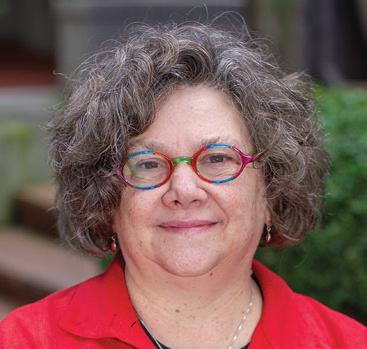
Dear Friends -
From the EXECUTIVE DIRECTOR
Laura Golino de Lovato
As always - thank you for your support! It’s because of you that NWPP can respond to the increase in demand for our services from the growing number of older adults facing housing insecurity.
This newsletter is brimming with great stories and updates. In addition, I'd like to touch on another vital subject that is critical to our services. Below, I’ve provided a brief update on the Supportive Housing Services (SHS) measure and some new challenges surrounding it. Thank you for helping us to KEEP SENIORS HOUSED!
The Supportive Housing Services (SHS) Tax Measure
Since 2021, 6,000 individuals in the tricounty area have been housed, and nearly 20,000 evictions have been prevented because of the SHS measure.
You may have heard or read recently about potential changes to the Supportive Housing Services (SHS) measure, and see results of polling conducted with likely voters asking about the measure and its future. In light of this new information, it’s a good time for an update on what’s going on and how NWPP is impacted by changes to the measure.
The SHS tax is a 1% income tax on individuals earning more than $125,000, couples who file jointly who earn more than $200,000, and businesses in the Portland Metro area with gross receipts exceeding $5 million. The tax is 1% of amounts above those thresholds. Annual revenue from the measure for the last two years has been about $330M - a 34% increase from initial annual revenue projections of $250M, making the impact greater than expected. And revenue projections for the coming years are expected to follow this trend.
In 2021, the first round of funding from the SHS tax was distributed to organizations across the Metro region, including NWPP. Rental assistance, placement into housing, case management, addiction treatment, mental health care and so much more that would otherwise not be available is funded by the tax.
For NWPP it’s been transformational. We’ve tripled the number of older adults we’ve kept in their housing or moved out of homelessness compared to pre-SHS years. This year we’ve served over 1,400 older adults with housing placement, eviction prevention, and case management. There is no doubt that NWPP could not have done this without the SHS tax revenue. For our clients these funds have made the difference between having a home or living on the streets.
But despite the influx of funds, homelessness in our region has increased. This increase is a nationwide trend driven by several factors - housing costs outpacing wages, inflation, the increasing fentanyl and methamphetamine epidemics, and of course a shortage of housing units. But we also know that if we didn’t have the SHS funds, homelessness in our community would be markedly and substantially worse.
New polling indicates a perception that the measure is not making a difference. As community members see an increase in tents and homeless camps they are right to ask about the overall efficacy of the measure. But we at NWPP know emphatically how critical the SHS tax revenue is. Metro Regional Government is currently considering multiple changes to the measure including indexing income levels to inflation, improving oversight and accountability, allowing housing construction as an allowable use, and - most importantly - extending the measure until 2050. Without extension, the measure will end in 2030 likely leading to those who’ve been housed to become homeless, and making our homeless crisis much worse.
If you'd like to learn more or share your persepctive on the measure, please reach out to me. I'd love to talk to you!
laurag@nwpilotproject.org
Northwest Pilot Project 2025 Impact Awards
Each year we celebrate the extraordinary people and partners whose contributions have been critical to the work of our agency during the past year. These organizations and individuals make it possible for us to fulfill our mission.


AGENCY IMPACT AWARD Recognizes a significant contribution that provided a transformative opportunity for NWPP. THE CATOR AGENCY is a family owned and operated Clackamas-based insurance agency. They are a knowledgeable and friendly team, serving their community by putting the unique and indiviudal needs of their clients first - just like NWPP! We were so thrilled to give The Cator Agency our Agency Impact Award for their ongoing and significant finanical support of NWPP and our clients. (Pictured: Heather Cator, Agency Owner)
COMMUNITYIMPACTAWARD Acknowledges the engagement of volunteers in supporting our clients and services. THE ASSISTANCE LEAGUE OF is a nonprofit organization that has served the greater Portland community since 1961. When NWPP helps a senior move into a new home, we provide them with essential living items. Over the past year alone, The Assistance League has supported NWPP with supplies for 200 bedding kits and 50 microwaves! We are so grateful for the support they have shown to us and vulnerable population we serve. (Pictured: Jamie Marucha, Peggy Albertine, Linda Goodman)

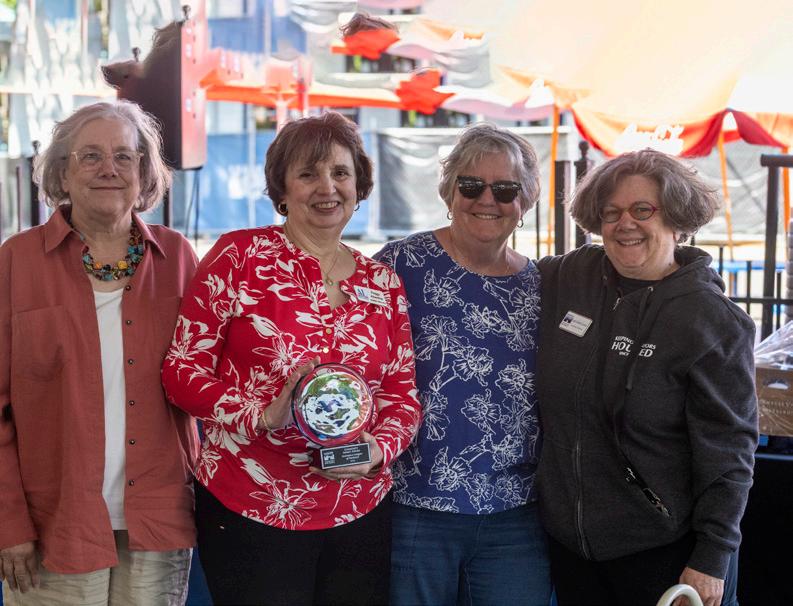
PROGRAM IMPACT AWARD Recognizes a significant contribution to our housing services and program. METROPOLITAN PUBLIC DEFENDER (MPD) is an invaluable community partner that has been a game-changer in supporting our work in overcoming common legal barriers to housing for seniors. We always breathe a sigh of relief when MPD agrees to work with one of our clients because we know that they are in good hands. Not all partners are created equal, and MPD is the gold standard. The entire team is kind, accommodating, and efficient in working with both clients and staff. (Pictured: MPD Attorney Nick Rivera with Rebecca Jones-Childs, NWPP Program Director)
PROGRAM IMPACT AWARD Recognizes a significant contribution to our housing services and program. MIKE SAMS, an exceptional property manager at The Oak Apartments, is proactive, flexible, communicative, and solution-focused in his work with the residents and with the NWPP staff. Mike cares deeply for the residents living at The Oak. That, combined with his strong management skills and hard work, has transformed the building over the last ten months. A great property manager makes a huge difference in the daily lives of our clients, and it makes our work easier and more fun, too. Thank you, Mike! (Pictured: Mike Sams. Photo courtesy of Cascade Management, Inc.)

We’re still riding the high from NWPP’s 2nd Annual Housing Seniors Hootenanny —and what a celebration it was! Held on May 4th at Oaks Amusement Park, this year’s event was more than just a fundraiser; it was a joyful tribute to the incredible community that surrounds and sustains NWPP: our supporters, donors, partners, families, and friends.
Evolving from our beloved Walk-A-Thon, the Hootenanny brought fresh energy and deeper connection. Together, we surpassed all expectations, raising an incredible $157,023.74 in support of housing stability for older adults.

$157,023!
What an incredible show of support! THANK YOU to Everyone Who Fundraised for NWPP!
On behalf of our Board of Directors, NWPP staff, and the seniors whose lives you've helped transform: THANK YOU!
A.C. Caldwell
Heidi Chimuku
Eileen Corren
Mary Crocker
Brenna Crocker
Karen Day
Terry Dalsemer
Katy Danforth Staley
Allen L. Dobbins
Susan Emmons
Joe Gillock
Laura Golino de
Lovato
Linda Goodman
JoAnn Herrigel
Janet Hitti
Deborah Hunter
Kai Jones-Childs
David Kingsbury
Dale Latham
Kerry Lyles
Joanie Lunsford
Carol Maresh
Cynthia McMurdo
Ann Middleton
Jan Okuhara
Thea Ostroy
Gail Owen
Victor Quiroz
Stephanie Roberts
Bailey Sackett
Ruth Schuld (Memorial)
Carmen Schleiger
Vicki Schmall
Hailey Shelnutt
Tania Siegel
Dorothy Steedle
Jacqueline Spurlock
Nicole Svoboda
Kate Suhadolnik
Marjorie Wazeka
Mary Voltz



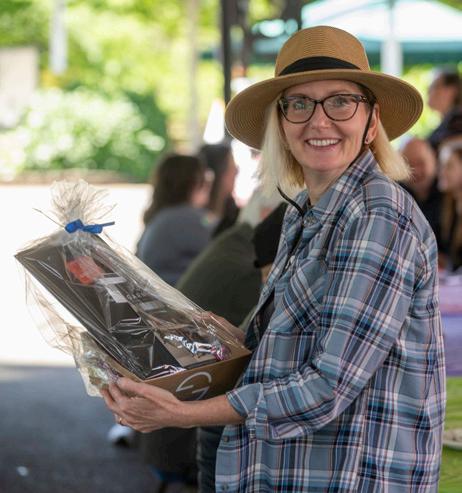


Top Individual Fundraiser: Susan Emmons $37,605.50
Susan has been a pillar of support for NWPP for many years. Her fundraising efforts are just one example of her deep commitment to our mission. As NWPP’s former Executive Director, Susan led the organization with vision, compassion, and heart. Her unwavering passion for housing justice and the well-being of older adults inspires us all.
Presenting Sponsor
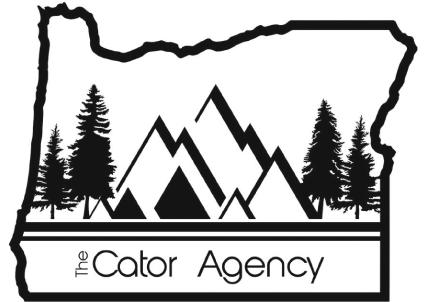
Benefactor Sponsors

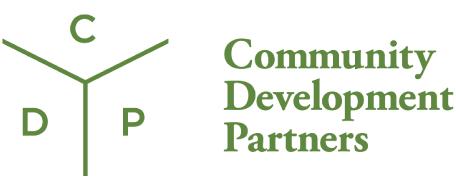
Sustainer Sponsors


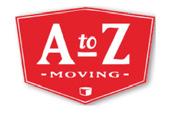



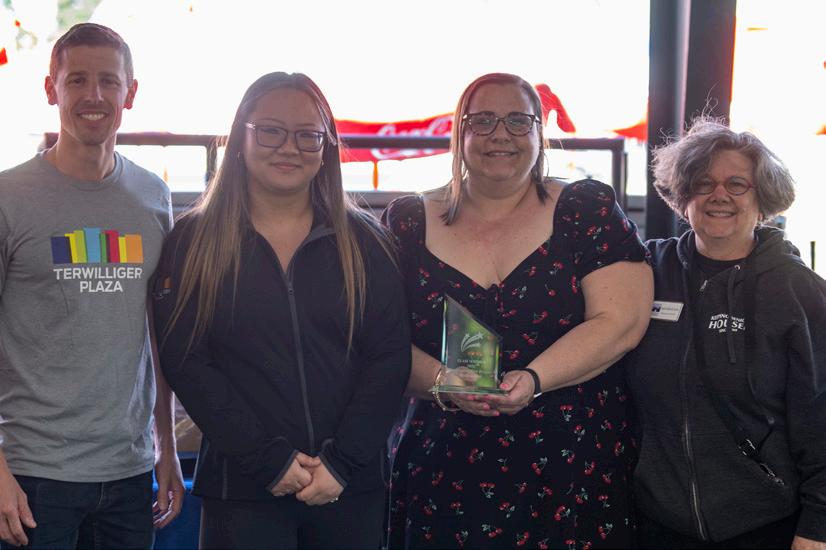
Top Team Fundraiser: Terwilliger Plaza $15,786.20
Once again, Terwilliger Plaza took the top spot in our team fundraising category! We are deeply humbled by the ongoing generosity of this amazing team and their dedicated donors. Your support fuels our mission and directly impacts the lives of the seniors we serve. Thank you for leading with heart and showing up in such a powerful way!



Supporter Sponsors: Friend Sponsors:
Portland Computer Guys
• AARP Oregon
• Heritage Bank Stark Firs Management
• Escape from New York Pizza
JD Fulwiler
• Multnomah County Commissioner Moyer Holst Architecture
• Willamette Dental Group
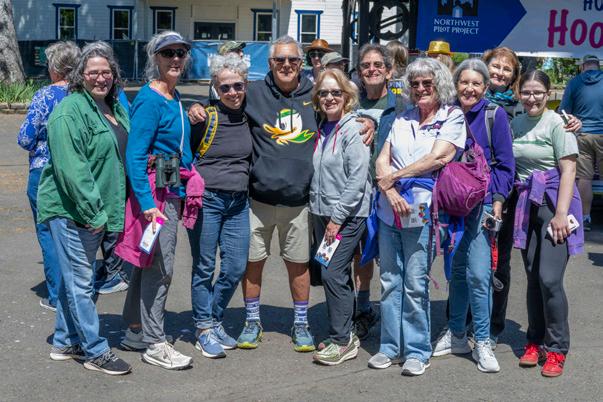
Couldn't join us at the Hootenanny this year?
Mark your calendar for May 3rd, 2026 at Oaks
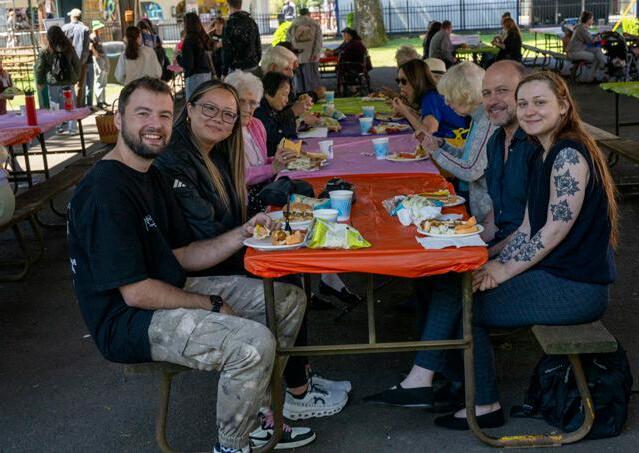


Park!
NWPP Retention Team Focuses on Client Success
As an organization, Northwest Pilot Project frequently advocates for homeless prevention as a key strategy for ending homelessness in our community. It is not enough to move people out of homelessness if they don’t remain stable in their homes long-term. Homeless prevention may be a month of rent assistance to get through a temporary loss of income, or a sudden expense, or it may be assistance with the move-in costs to more affordable housing. These are examples of very specific and finite homeless prevention interventions. But homeless prevention can also be broader in its approach.
The NWPP Retention Team consists of five full-time staff members and a Jesuit Volunteer Corps/Americorps Volunteer who work together to support clients in a variety of ways. They respond to needs that arise for our clients after they have moved into their permanent housing that threaten their health or housing stability. The staff has flexibility in the type of support they provide, always with the guiding principle of long-term success in housing. Staff may be working with people who just moved into housing and need support making the transition, or they may be responding to clients who moved in years before, and who have new needs that are emerging.
The Retention Team often meets with clients in their homes, and have developed strong working relationships with on-site managers in apartment buildings throughout Multnomah County. Though the daily assignments vary, every day for the team includes a lot of phone calls, trips around town, and keeping track of a thousand details. days are A
A typical day for the NWPP Retention Team:
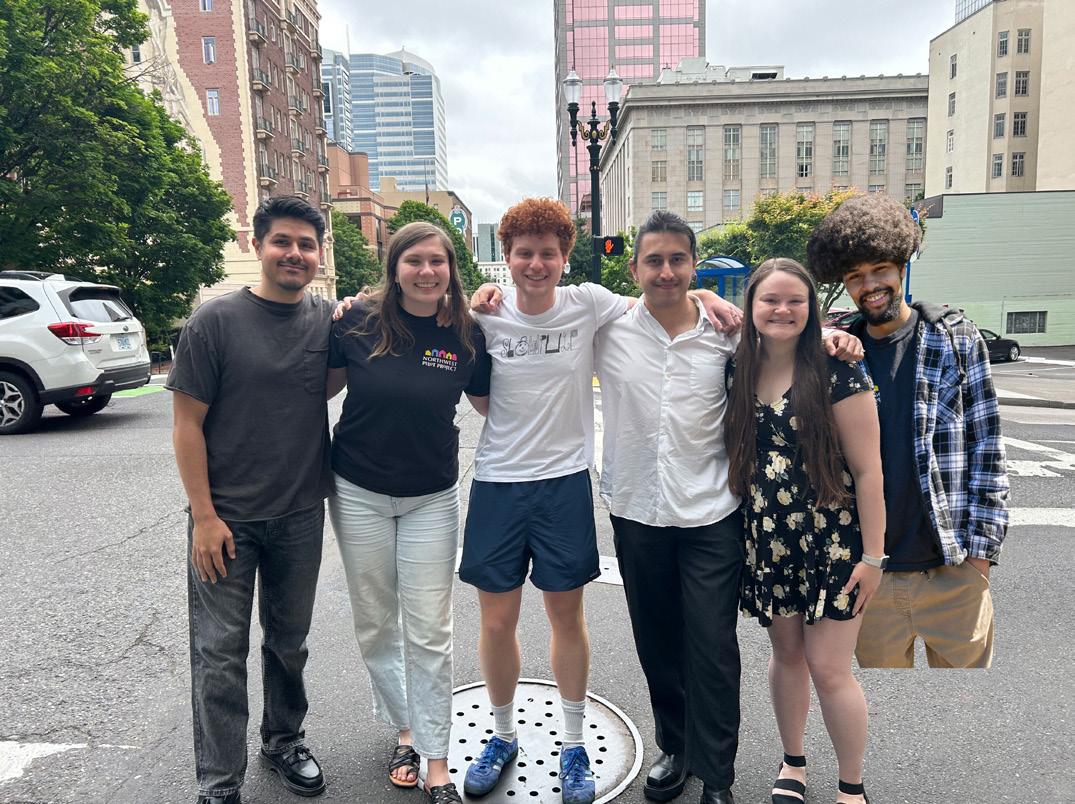
• Help accessing in-home care for a client who needs some extra help to live alone.
• Facilitating communication between a client and their landlord.
• Helping a client complete a reasonable accommodation form so they can request accessibility modifications to their unit.
• Connecting a client to a care coordinator for health care coordination.
• Sorting out paperwork from the Social Securit y Administration.
• Checking in on a client who is feeling isolated and lonely.
• Escorting a client to a medical appointment.
Help Us Make a Difference
In the first half of this year, NWPP’s Retention Team provided services to 176 households, all of whom were originally placed into housing by NWPP.
Your support—whether through in-kind donations or financial gifts—directly helps us provide stability, dignity, and care to the seniors we serve. Every item and every dollar makes an impact.
Donate today by visiting our website or using the enclosed envelope. www.nwpilotproject.org/donate-items/
NWPP Retention Team: José, Olivia, JP, Chris, Haylee, Brailon
NWPP Spring Housing Forum
NWPP hosted its second housing forum on April 23 - “Barriers to Housing Older Adults: Insights from Housing Service Providers” to highlight the challenges lowincome older adults face in accessing rental housing. The forum featured service partners from the Metro area who shared insights into how service providers help older adult clients navigate housing barriers as they try to secure housing.
Thanks so much to our panelists: Kathryn Gerhards, Director of Employment Services, Easter Seals of Oregon; Jason Coulthurst, Housing Access Manager, NWPP; Leslie Nelson, Managing Attorney, Metropolitan Public Defender; Phil Cleary, Social Health & Housing Specialist, Housecall Providers.

How Screening Criteria Keeps People Out of Housing
One of the biggest barriers our clients face when trying to secure housing is getting approved through the rental screening process. When you apply to rent an apartment, landlords use screening criteria to assess whether or not a tenant is likely to pay rent on time, care for the property, and follow lease rules. Criteria are based on factors such as income, credit, rental history, and criminal background checks. Screening policies vary by building, but most do not account for the applicant's personal growth, current ability to succeed as a tenant, or recovery.
Common Screening factors that affect our clients:
Income: Most landlords require income that is 2.5 to 3 times the rent. Many NWPP clients earn around $1,100/month—barely enough to cover rent, let alone qualify.
Credit History: Minimum credit scores of 620–650 are common, but many clients fall short. Credit scores are used to predict rent payment, despite little evidence they accurately do so.
Evictions&RentalReferences: Past evictions or poor references— even from years ago—can lead to denial, regardless of current stability.
Debt: Unpaid rent or property-related debt often results in automatic rejection, even if clients are now financially secure.
CriminalRecords: Old convictions—sometimes 20+ years ago—can still disqualify applicants, with little consideration for rehabilitation or present-day circumstances.

How NWPP Helps:
» Identify and address potential barriers
» Advocate by submitting appeal or accommodation requests if denied
» Ask landlords for flexibility
Our experienced staff and trusted relationships with landlords allow us to help many clients overcome hurdles and move into safe, stable housing.
While these criteria are important, they set a high bar for many NWPP clients to meet, and none are proven to be solid predictors of good tenancy. Most importantly to our clients, is that failing to meet even one can mean a rejected application and no place to live. NWPP helps clients navigate through this complicated process to ensure they they get the housing we all deserve.
One of NWPP’s ongoing advocacy efforts is to work with owners and property managers to lower screening barriers and increase access to housing for very low-income older adults. You can read more about the Reasonable Accommodation process, including sample letters, on our website. Scan the QR code to read more.

Scan the QR code to watch the full Spring Forum online
Non-Profit Org. U.S. Postage PAID
Permit No. 1729
Portland, OR
1430 SW Broadway • #200 • Portland, OR 97201 (503) 227-5605 • www.nwpilotproject.org
YOU'RE INVITED to an important film screening and conversation:
Northwest Pilot Project is delighted to be partnering with the Portland Art Museum’s PAMCUT program to host a screening of “No Place to Grow Old” on Saturday, July 26, 7:00 - 9:00 pm. This important documentary is a powerful exploration of the rising crisis of senior homelessness that is quietly unfolding across America. The film emphasizes the dignity and hope that our older adults need and shines a light on the systemic issues contributing to increasing homelessness among older adults.
Following the film there will be a Q&A with members of NWPP’s Housing Team, filmmaker Davey Schaupp, and producer Michael Larson.

Scan the QR code to learn more and register
